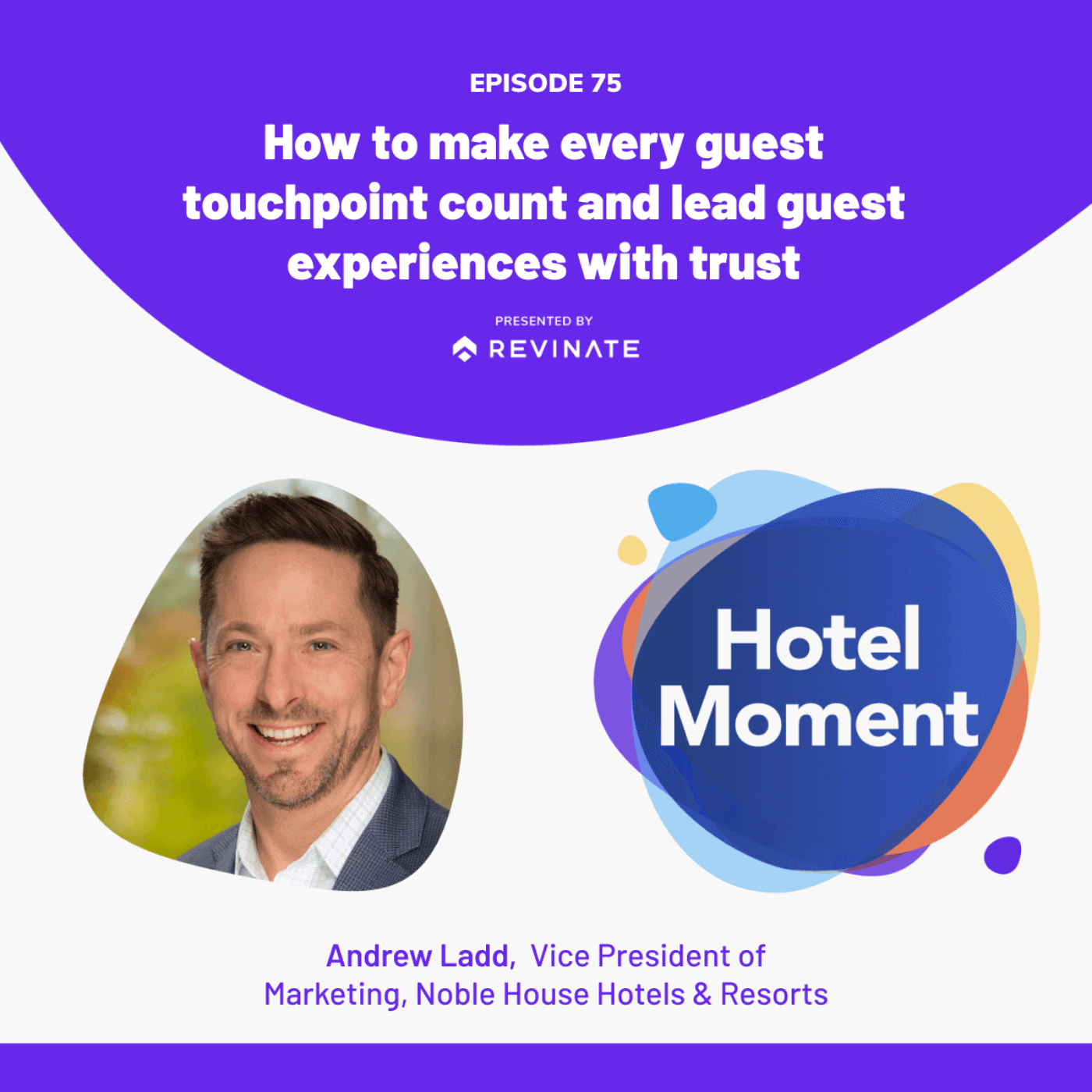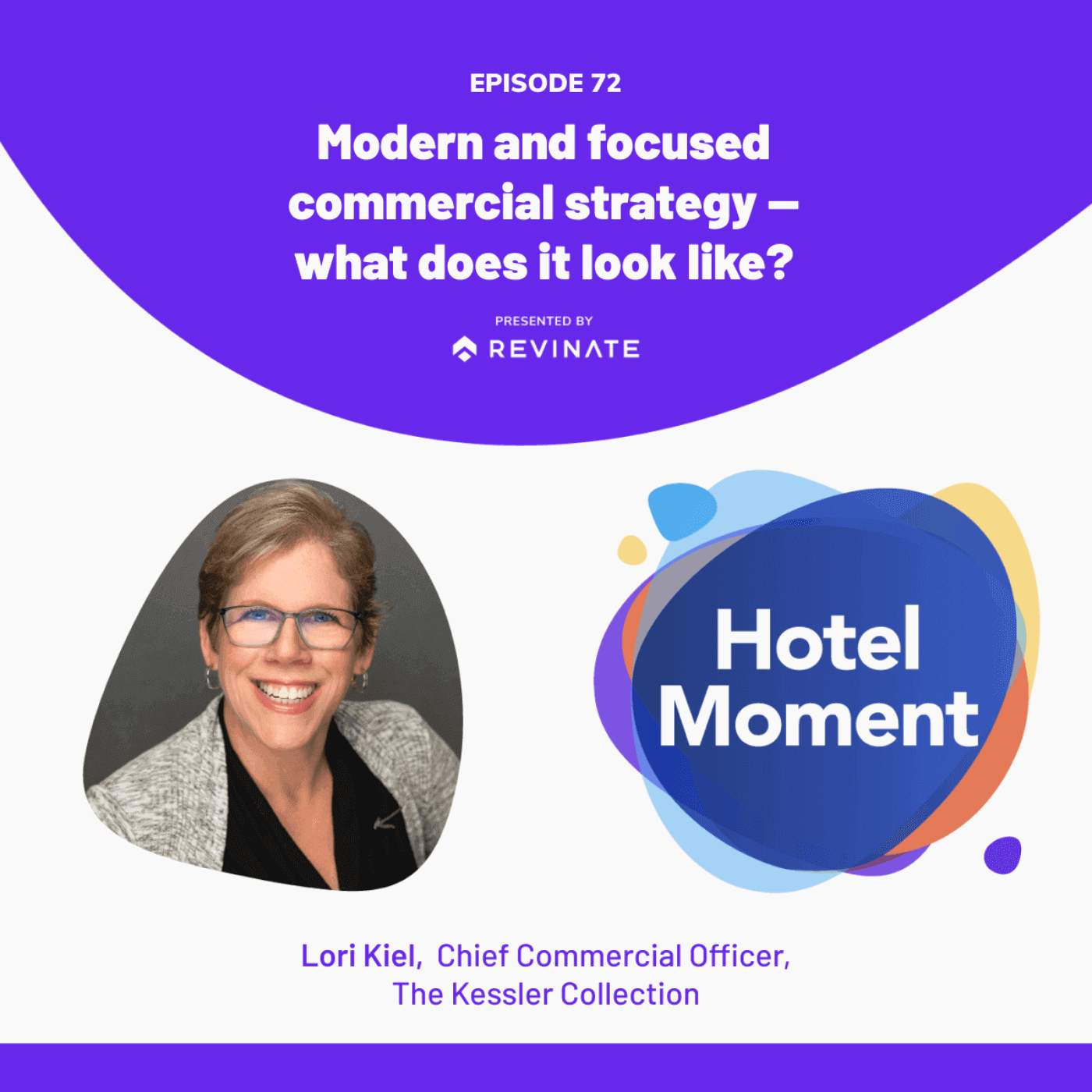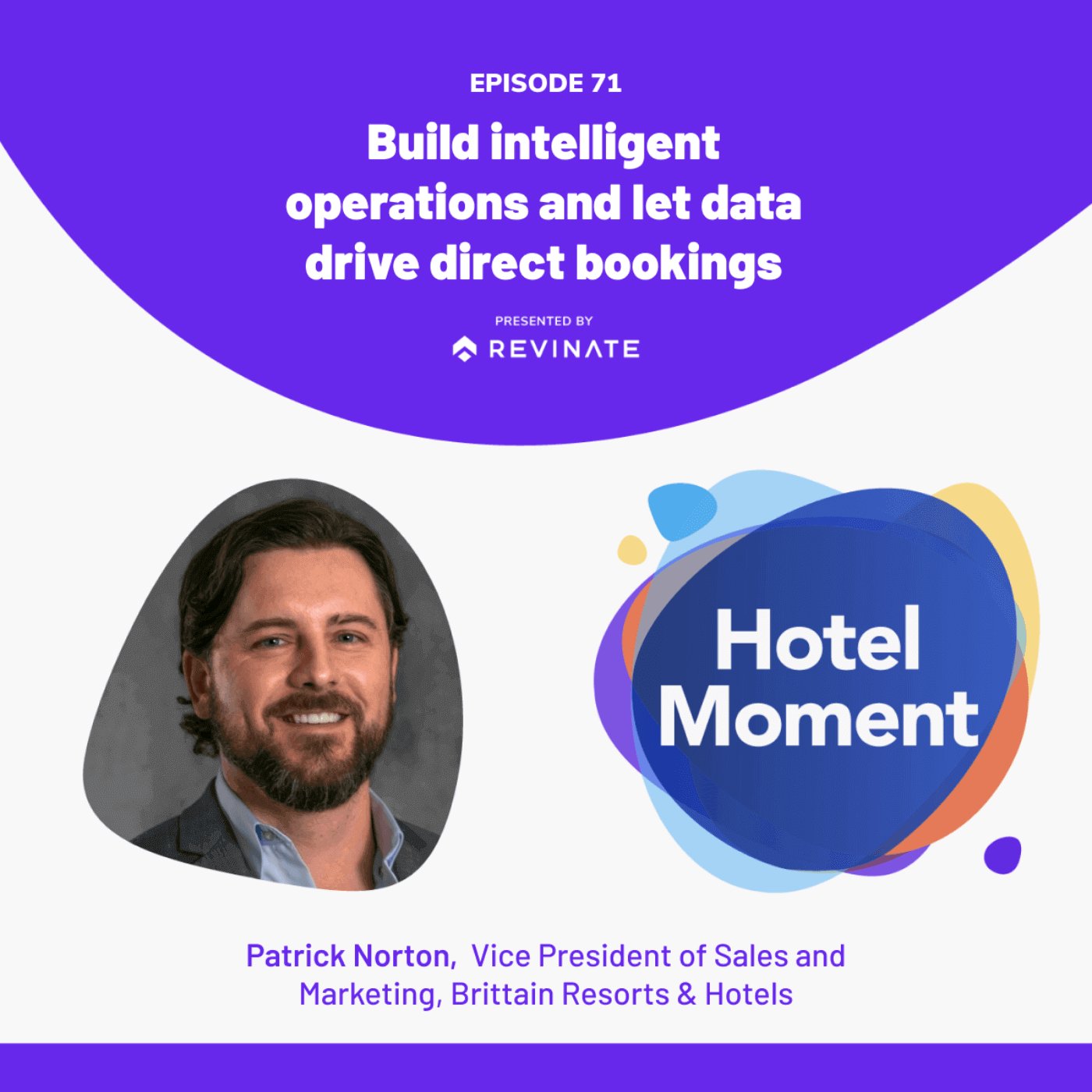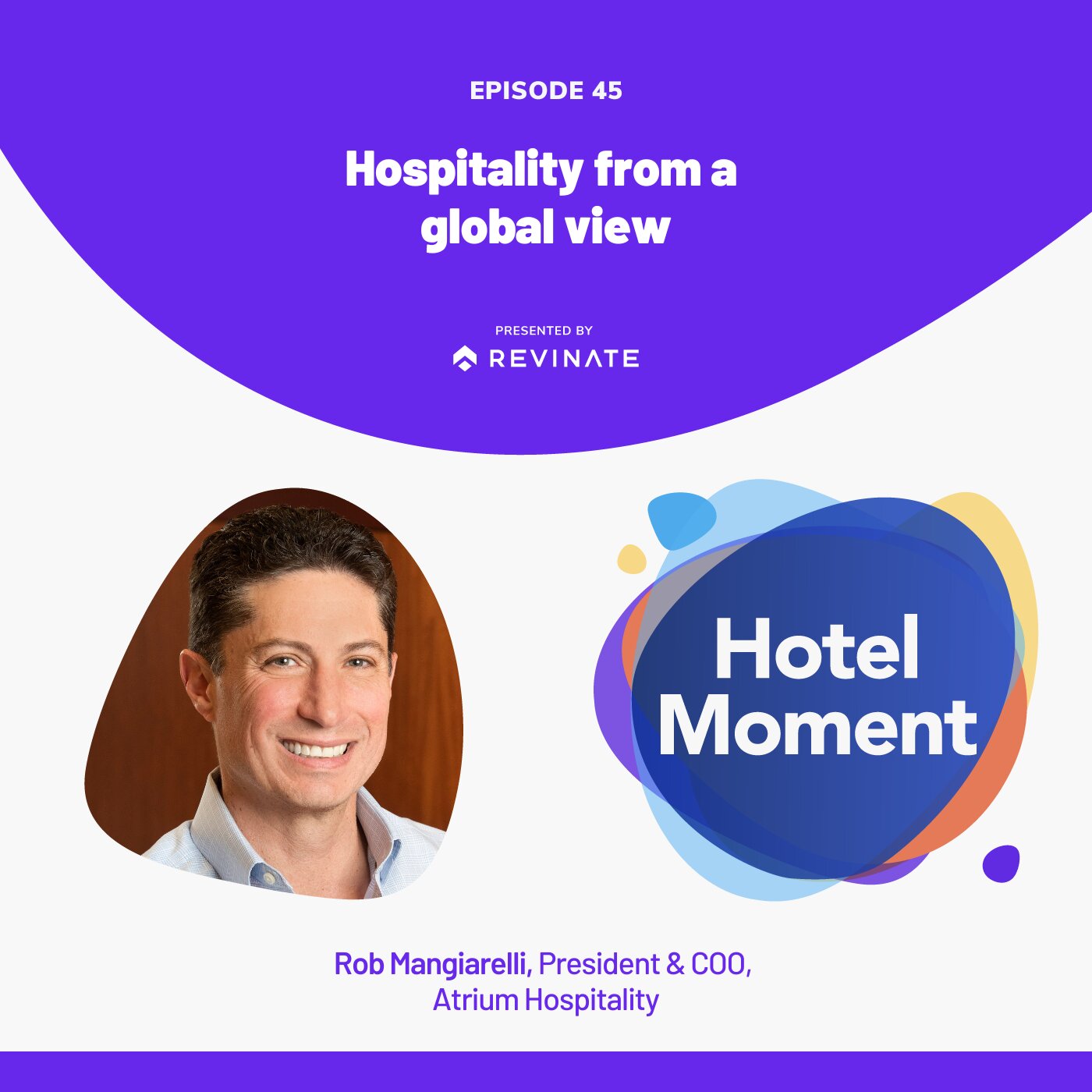

The Hotel Moment podcast — episode 45
Hospitality from a global view
This week on the Hotel Moment podcast, Karen Stephens, Revinate’s CRO, and Rob Mangiarelli, President and COO at Atrium Hospitality, discuss how traveling around the world presented them with new hospitality perspectives. You’ll find out why welcoming different views of the guest experience is important, while also gathering insight on data collection and revenue management.
Tune in to hear new perspectives and gain some last-minute budget season tips!

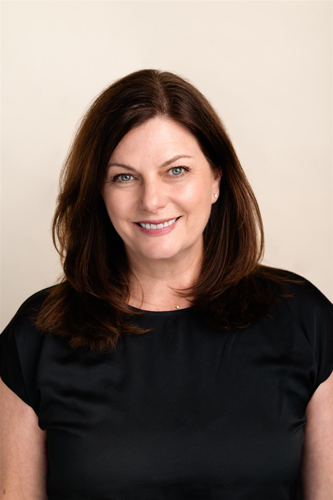
Meet your host
Karen Stephens is Revinate’s Chief Revenue Officer and runs the sales, marketing, and customer success teams. She has more than 20 years of experience in the industry alone.
On the Hotel Moment podcast, Karen speaks with leaders to draw out their experiences and insights. She is also a Francophile and Prof K — a coach, a mentor, a guide to the people who work with her.
Now Playing
Transcript
Karen Stephens: Hello and welcome everyone to the Hotel Moment podcast. I’m your host, Karen Stephens, the COO of Revinate. Every week we talk to different industry leaders about hospitality, and trends, and cool things happening out there. And I’m very excited to be joined this week by Rob Mangiarelli, who is the COO of Atrium Hospitality.
Welcome.
Rob Mangiarelli: Thanks Karen it’s, uh, exciting to be here.
Karen Stephens: Yes. Well, I’m very excited to have you on. You know, I had a look at your, your LinkedIn, and it looks like you’ve had really vast experience, um, within hospitality, with Hyatt for 25 years, and now you are working for Atrium Hospitality. So can you tell us a little bit more about your current role?
Rob Mangiarelli: Sure. So I joined Atrium back in February as the Chief Operating Officer. We have 80 plus hotels around the country, 20,000 rooms, primarily Marriotts and Hiltons. And I moved over from Hyatt. We can get back to that. To, uh, to really move into an operations role. And then in May, they added on the president title to my new role. So I’m now both the president and the Chief Operating Officer. And like I said, we have 80 hotels. We have 20,000 rooms, 7,000 employees across the country.
Karen Stephens: Very cool. Well, I definitely wanna dig into all of that because the other thing that I, that I noticed when, when looking at your background is deep, deep roots in finance. So I really wanna get into data, and finance, and how you think about running a company and, and also, you know, how interesting it is to move from a huge portfolio and enterprise brand like Hyatt, to a group that’s still very, very large, but, definitely different, right? Definitely different animals. So, I’m very excited to have that conversation. But first I have a few questions for you just to warm you up and also introduce the audience to, to you on a little bit more of a personal level, if that’s all right.
First question, When did you start work in the industry and do you remember your first day on the job?
Rob Mangiarelli: I do. So it was, it was interesting. So, immediately after college, I was an economics major at Stanford, and I wanted to be a math teacher or a lawyer. And when I graduated I didn’t know what I wanted to do, so I went back home, Colorado Springs, and I was looking to keep myself busy at night.
So I got a job working night audit at a Holiday Inn and, the first day, I was tired because I’d never worked overnight before. So it was just a long night. And that started my, long history of, coffee drinking, was working night audit at the Holiday Inn.
Karen Stephens: It’s so funny because I was really wondering when I asked you that question, I talk to a lot of people on the podcast, and so many of us started in hospitality and just worked our way up. But that’s really interesting, you starting with a degree in economics from Stanford, and still making that journey, literally from the, from the front desk up. So very cool.
Rob Mangiarelli: It’s a great reminder, I think for all of the people joining this industry, that it’s not just a job, that it can turn into a career. And it really doesn’t matter what your background is when you’re coming into the role. It really is about learning the business and, and figuring out what you love.
Karen Stephens: Yeah. Absolutely. And I, and that is what I, I do love about this industry. Because yeah, absolutely you can, you can come in, in many different avenues, and there’s a lot of places to grow and, it’s fantastic. You would be amazed how many people I talk to that start, you know, at a hotel, and work their way up.
So, very cool. All right, so second question. What was the most uplifting moment so far in your career?
Rob Mangiarelli: So there, is a director of finance for Hyatt right now who works at the Hyatt Centric in Times Square. And when I first met her, I was the controller of the Hyatt Regency Greenwich, and she was an admin working in the engineering department, and she was looking for a new role. And I had an opening as, uh, income auditor. So I moved her into finance, or into our accounting department. And then I left Greenwich and I went to the corporate office, but watching her career grow year over year. And then she was named manager of the year, a couple years back, at the hotel. And her boss called me to tell me that she was a manager of the year, and to think about how her career had grown and where that all started. I think that was probably, you know, one of those great moments of your career, just being able to look back at, uh, the people you’ve worked with and what they’ve been able to do.
Karen Stephens: What is the most striking experience so far on a personal level, in terms of a holiday, or a restaurant, or a, a hotel; something that you’ve experienced, on your own time, on your leisure time that comes to mind?
Rob Mangiarelli: Oh, the most striking experience. Well, okay, so take this, uh, picture. The one over that shoulder? No, this shoulder. That shoulder. So for my 40th birthday, my wife, took me to Pebble Beach. And I, I love playing golf, and we did the whole thing. We, you know, got the caddy and did the walk, and she hired a photographer to follow me around and take pictures all day, a professional photographer. But just that walk, and the caddy who knew everything about the course, and he was not only my caddy carrying my clubs and telling me the distance, but he’s also my tour guide. And he’s pointing out houses and he’s telling me about history and just that whole experience. Right? It’s just that reminder in our business that this isn’t about, you know, stuff, it’s about experiences. And that was one of those memorable experiences that he was able to create for me. It was a, it was a fantastic time.
Karen Stephens: That’s great. Obviously I work for a tech company and we, we wanna leverage technology to improve guest experience, and we wanna make sure that we’re helping drive revenue, et cetera, for our customers. But I think you hit it on the head. It really comes down to the people that are in the hotels that, bring that experience to the guest, or at the golf course or whatever it is. You can’t replace that. And so I love hearing stories like that. I also love Pebble Beach. I mean, what a fantastic, what a fantastic place. So beautiful.
All right, number four. Have you met any celebrities while you’ve been in the trenches?
Rob Mangiarelli: I have. A lot of them. We’ve had presidents stay in our hotels. We’ve had professional athletes. We’ve had most of the basketball teams stay with us when I was working at the Hyatt Charlotte. But the, the funniest one, I met Ed Sheen at the Grand Hyatt Rio, was one of the hotels I was responsible for, and I was doing a walkthrough with the General Manager. And we walked into the gym, and there’s Ed Sheeran running on the treadmill.
And of course I have no idea who Ed Sheeran is. And, he had to tell me and I was like, oh, that’s who he is. You know, he’s sweating away on the treadmill and we’re, we’re walking the hotel. So, you see a lot of people. And then he was great. He was by the pool, talking to people, taking pictures. For the most part, celebrities are pretty gracious, as long as you try to give them their space.
Karen Stephens: Right. Sometimes it’s good if you don’t recognize them right.
Rob Mangiarelli: For sure.
Karen Stephens: Then you’re, then you’re, really playing it cool. Probably to the level they appreciate, right? So that’s good. All right. Final question here. Who are the women at work you’ve been most inspired by? So you talked about a woman just a moment ago, but is there anyone else you can think of, uh, in your career that has been very inspirational for you?
Rob Mangiarelli: I’d say there’s two that jump immediately to mind. One of them, worked for me, for 15 years, uh, Gina Tallarico. She’s the Vice President of Asset Management now at Hyatt. But when I hired her the first time, she was my number two running finance for North America. And what I loved about her was the way she balanced her strengths and my weakness off, you know, her precision for being a great accountant, her ability to maintain relationships, her understanding of everything that was going on, was a great counter to, what I was good at. And I think surrounding yourselves with somebody who, who can really play to your weaknesses was great. And, you know, we’re still good friends, today.
And having her around was fantastic. And I think second was Joan Bottarini. Joan’s the CFO at Hyatt. And she started in the company the same time I did. And so our careers kind of grew together. And just watching her, maybe six years ago, seven years ago, she left her job in the Americas to go take a job in Asia. And in a male dominated industry, in a male dominated company at the time, and then in a male dominated atmosphere like we have in Hong Kong. For her to be able to put herself out there and then that set her up to come back and be the CFO at Hyatt. And you know, it was a great inspiration for me really, as I thought about leaving Hyatt of, you know, here’s somebody who took a chance. Who took a chance and put themselves out there to, uh, try a new experience. And I, I thought it was fantastic. And, she’s just a fantastic person as well, so, that makes it even better.
Karen Stephens: That’s great. That is very inspirational. I, I love hearing that, and I think it, I think that dovetails nicely into some of the things I did wanna talk to you about today. So, um, you know, being able to work for a company that is global, and the experience you have there. Can you just talk to me a little bit about what it’s like to work in different international markets and what you think, you know, that experience brings to you to be able to then come back to the United States and focus more on North America.
But what are some of the experiences you had in your career being able to work globally?
Rob Mangiarelli: Well, yeah, it’s, interesting. So the first 15 years of my career, I only worked in North America, and I had never traveled internationally, as a child. I’d never stayed in a hotel. As a child. We stayed in motels that you drive up to. So I didn’t have that experience. And I remember our first international trip, our first big international trip, we had a global general managers meeting in Dubai, 2008. And you know, Dubai, there’s cranes everywhere, brand new shiny buildings, the cleanest place on the planet, and service was incredible, far beyond anything I’d ever experienced. And we left Dubai after that meeting, and since we were already halfway around the world, we went to Mumba. So we flew from Dubai, which was the cleanest, nicest, newest place I’d ever been to India, which was not the cleanest, nicest, newest place I’ve ever been.
But the service in the hotel was spectacular, and the passion that the teams had of going to work, and the pride they took was incredible. And what I learned really moving from market to market to market is, you get to experience new cultures, you get to experience new things, but the passion of the people who work in those hotels, you see pieces of that as you travel around the world. And its just a great experience, culturally to be able to do that.
But from a business standpoint, it also really opens your eyes on how business is different in different parts of the world. That service culture, how you treat people. Yeah. I remember, my first time in Shanghai. There were two people, and their job was to push the button to open the elevator for you.
And coming from the United States, I thought, “Oh my gosh, what a huge cost burden on the hotel to have somebody there.” But that was the expectation of the guests who stay there. And it just reframes your mind when you’re running a business of, you can’t run it relative to how you want to run your business. You have to run your business based on the expectations of the customer. So learning what that is in every market, I think just makes you a better leader.
Karen Stephens: I would really agree with that. I, I had the opportunity to work in London, uh, for a few years during my career, and I also studied in France when I was in, at university, and the opportunity to, get a different perspective. I think we could admit as Americans, sometimes we can feel like we’re the center of the universe, and that everybody must do it the way we do it, and that is not the case.
There’s a whole big world out there, and there’s different expectations, and different cultural norms, and if you approach it with an open mind and kind of put your own biases to the side, you can learn a lot. And also, you know, find a lot of opportunities, for growth, for expansion, for partnership. So, I really enjoy talking to people who’ve had that and how mind blowing to go from Dubai.
By the way, I’ve stayed in the Hyatt in Dubai and it’s phenomenal. Um, What a contrast though. I’m just thinking, this is your first time out of the country and to go to Dubai and then Mumbai back to back, you must, your head must have just been spinning.
Rob Mangiarelli: Oh a absolutely. It was, it was like entering a, a different universe. And you know, I’ve had the pleasure of going to India maybe 2 or 3 times a year for the last 4 or 5 years I was with Hyatt, so I love the trip and it’s changed a lot since ’08. The airport is newer, the roads are newer, but still, when you see that level of poverty, and whether it was in Mumbai, or whether it was in Brazil, it’s just a reminder, right, that it’s a great big world and we are very fortunate for what we have and, and it, just puts things in perspective.
Karen Stephens: Yeah, I think that’s really true. I mean, to have a bit of gratitude because there are a lot of people who are not as fortunate by a long shot, so wow. That’s again, great perspectives, you know? Great perspectives. Okay, very cool. So you had mentioned before you have a background from Stanford. Your degree was in economics, and from Stanford, so, and I noticed that a lot of your work experience really centered around finance. So now as you think about the position that you’re in, you’re the President, you’re the COO, you’re on the operational side of the house. Can you talk to me a little bit about the importance of, of data, not just financial data, but how you kind of think about, it’s a different lens, right, than most people have coming into those positions.
Rob Mangiarelli: Absolutely. But I think you, what you really see is how our industry has evolved over the last 20 years. I remember when I came to the corporate office, one of the reasons I think that I was able to move up so quickly in my career, and try those new roles was because I knew where the data was.
I knew how to use it, and I knew how to explain it in a way that people understood. And, you know, this was back in the day when we did everything in Excel. And you linked together a hundred workbooks and I was probably the only person who knew what a V lookup was or how to write those equations.
But back then, I think, you know, knowledge was power and whoever had the data, had all of that knowledge. And our industry has really evolved over the last 15 years. We have more and more information about our competitors, about our customers, about our associates, and figuring out how to use that to drive decisions. I think it is now more ingrained in our business than it ever was. I mean, take revenue management as a perfect example. We didn’t have revenue management when I started my career. It was five people sitting in a room making guesses about what was gonna happen in two weeks, or it was changing your rate once a year, and now we’re changing rates by the minute, in our markets. So, data really changes the way you think about revenue management. But it then rolls into operations. It rolls into every facet of what we do. It changes the way you look at new hires, right? What are our turnover rates in certain departments in certain areas. How do we think about our training to better impact that? And you know, that’s I think the beauty of maybe my background, is being able to look at all of that data and turn that into insights operationally.
Karen Stephens: You hit it on the head. How do you get, there’s a lot of data out there, right? So the challenge is how do you actually consolidate all of that so that you can interpret it? And action it. And, and I’m curious, you mentioned, uh, you have 80 hotels in your portfolio. Sounds like it’s a variety of brands, right?
You’ve got some Marriotts, you’ve got some other brands.
How do you think about stitching together? Or do you have the ability to look and see what guests are across all of that portfolio? Or is that something that’s rather hard to get to? I mean, with, you have separate loyalty programs for all of those brands, so what do you do as a management company to kind of understand who your loyal guests are, just for your particular, for Atrium?
Rob Mangiarelli: Well, that’s the difference. I think one of the biggest differences between now working for Atrium, and before working for Hyatt. When you’re working for Hyatt and you’re working for one of those brands, you are concerned about loyalty and crossover, and who moves from what hotel to the other. When you’re working for a management company or a franchisee, it’s different. Nobody knows who Atrium is and when they’re staying in our hotel, they don’t know that they’re staying in an Atrium Hotel. They know that they’re staying at an Embassy Suites. So we try to deliver that Embassy Suites experience, not the Atrium experience. We don’t spend a lot of time looking at whether our customers are moving from Little Rock to Norman, unless it’s a group customer, and then it’s about building that relationship with a group to get that multi-unit experience. But from a transient standpoint or from a loyalty standpoint, we’re less concerned about that than I was when I worked for a brand.
Karen Stephens: Right. And that absolutely makes sense. I think when you do have a branded portfolio, as you talk about, we, we work with some customers that have collections of independent properties, which is a bit different. Because with an independent property you can obviously access the PMS and get data, put that into one system, and then see how you can cross promote across the brands, which again, if you’re looking at independent, you kind of need that firepower, right?
Because you don’t have, like, you know, if you have an Embassy Suites, they’re obviously marketing through Embassy suites, and if you have a Marriott, you’re relying on Marriott. But for independents it’s a little different. So, but that’s an interesting perspective.
Rob Mangiarelli: Yeah. And I think it whether it becomes important is to then work with the brand partners. So we have a great relationship with Marriott and we have a great relationship with Hilton, and we have a great relationship with IHG. And figuring out how can we leverage their strength, and their work with their loyalty members to make sure that they’re staying in our hotels, so that we’re good partners. So as opposed to us trying to do that ourselves, it’s really us trying to do that through them.
Karen Stephens: Through them. Right, right. Which makes perfect sense. Okay. So just a couple more questions for you Rob. We are, we are in budget season. Here we are, and you’re the finance man, you’re the President. So what advice do you have, to our listeners out there, and they’re thinking about budget season, there’s a lot of unknowns happening out there.
What, what’s some pieces of advice you can leave our listeners with, as we go through the next couple?
Rob Mangiarelli: As a finance person, this is always awkward to say, but spend as little time doing your budget as possible. We start way too early as an industry, right? You start doing your budget in August. You finish it in January. You spent half the year and then two weeks after you finished it, you’re wrong.
So if you’re going to be wrong in your budget, be wrong quickly. The amount of time and brain damage that we put into our budget process is counterproductive. We need a budget. We need that to be a point in time. But then we need to recognize that that point in time is beyond us, behind us. And as we move forward, it’s about our forecasts, and how can we now project the next 60 days, the next 90 days, the next week and a half to think about our staffing, our schedule, our needs. But not, how do we compare to what we thought was going to happen last October? So I think this whole concept of budgeting, it’s great to sit down and think about your business strategically, but getting caught up in the decimal points and the minutiae, I just think is an old school way of thinking and it’s counterproductive for our teams.
Karen Stephens: Wow. You know what? I love that perspective, Rob. That is, that is refreshing. And I think the quote of the day is, limit the brain damage, you know, stop the brain damage. Because we do the same thing, obviously. We have budgets and forecasting. We do all of that as a tech company, and it’s a big lift.
And you’re right, as soon as the year takes off, things change. So it’s more important to be able to forecast, and pivot, and roll with the waves as we get into the next season.
Rob Mangiarelli: Exactly.
Karen Stephens: Well, hey Rob, it’s been a real pleasure. Thanks so much for joining me today. And if people wanna learn more about Atrium Hospitality, where should they go?
Rob Mangiarelli: They can find us on our website at atriumhospitality.com.
Karen Stephens: Easy peasy. All right, thanks Rob. Take care.
Rob Mangiarelli: All right, thanks Karen appreciate it.
Media
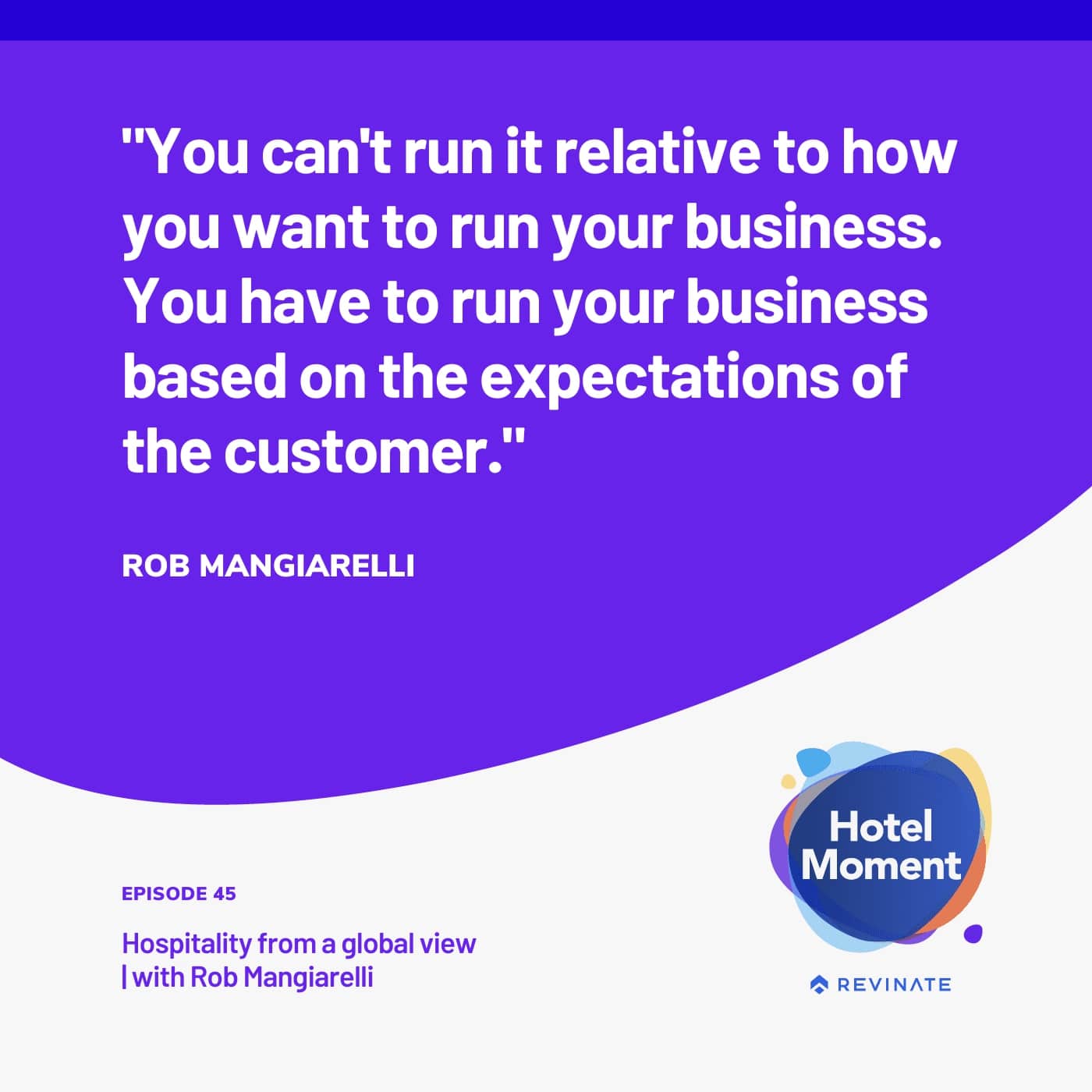
Quote from Rob Mangiarelli, President and COO of Atrium Hospitality
Video clip | If you’re going to be wrong, be wrong quickly
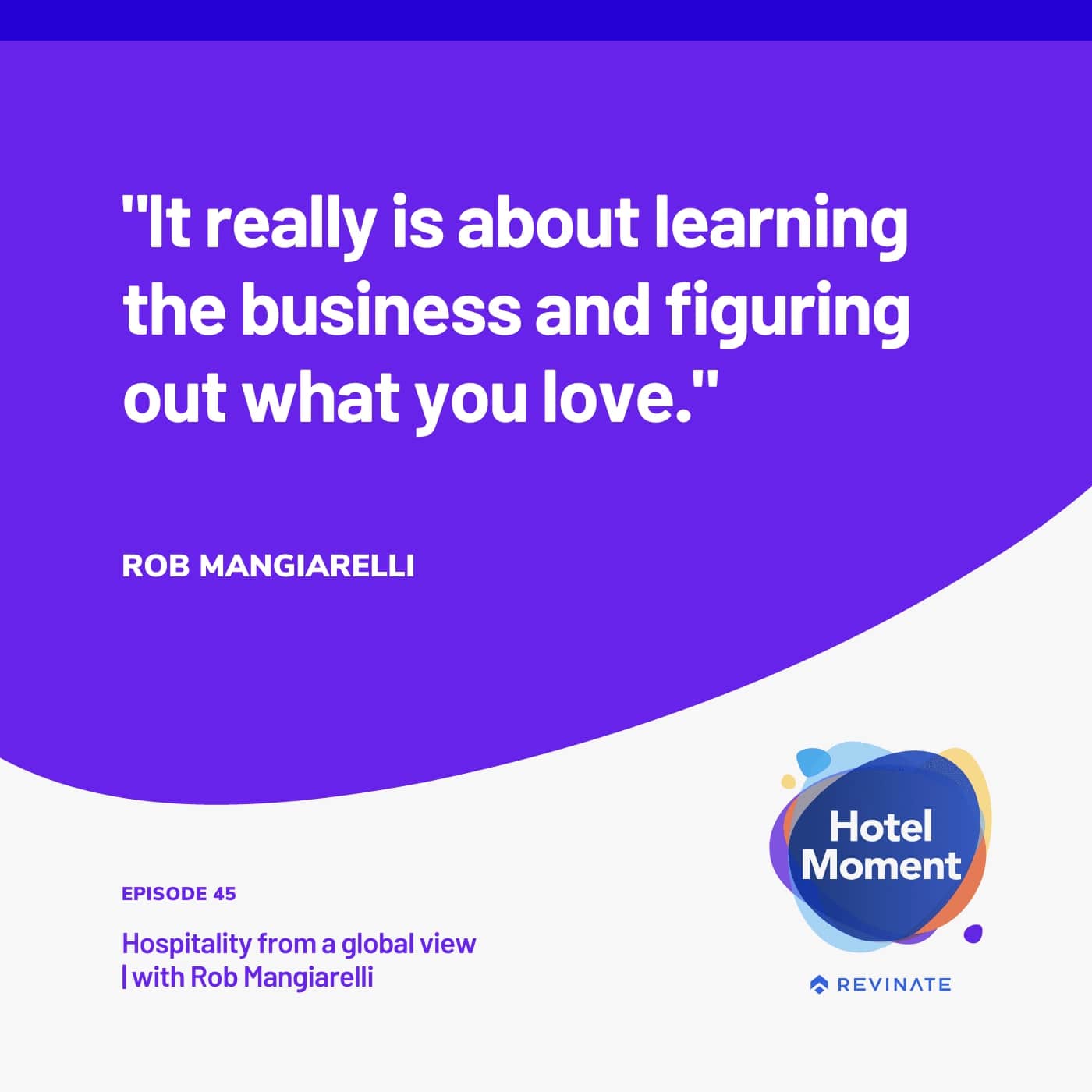
Quote from Rob Mangiarelli, President and COO of Atrium Hospitality
Video clip | Learn the expectations of the customer
Related episodes


Be the first to know when a new episode drops
This site is protected by reCAPTCHA and the Google Privacy Policy and Terms of Service apply. *Required fields.




